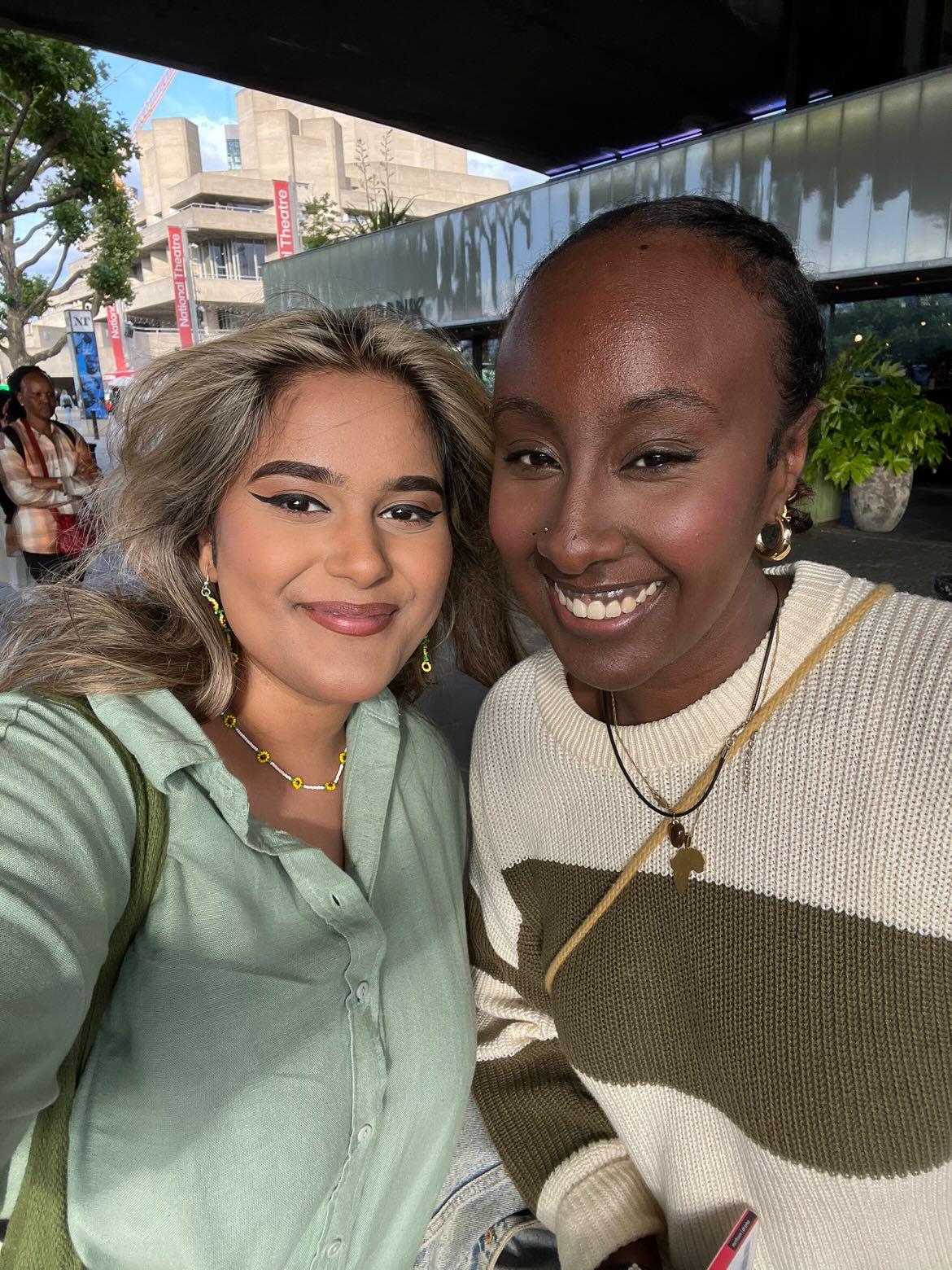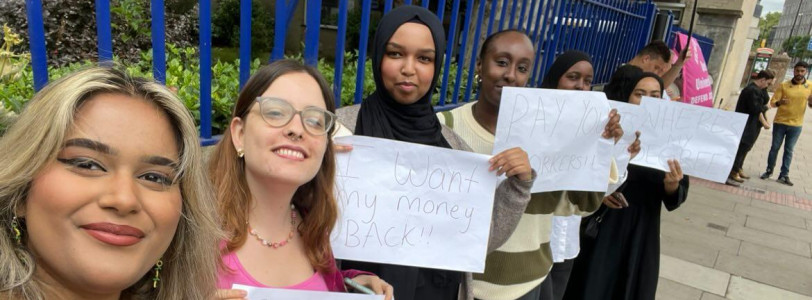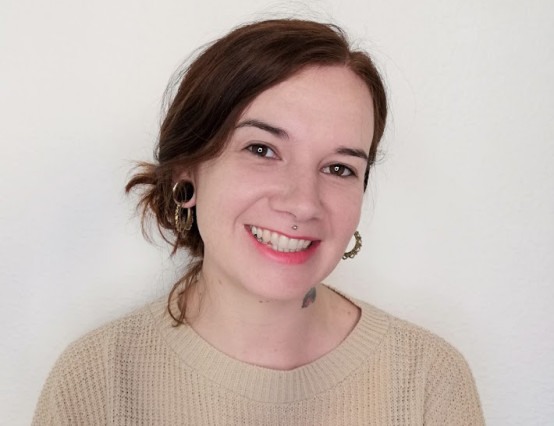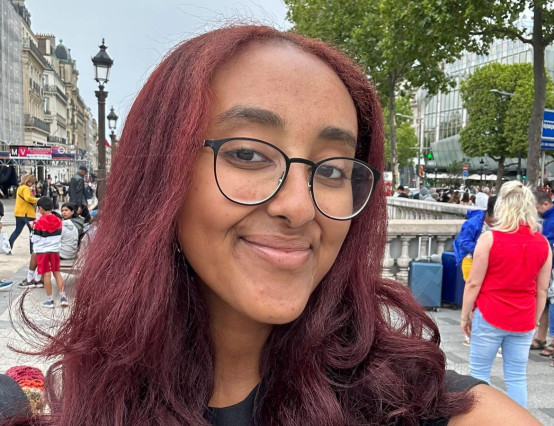I chat to my friends Sophia and Sabirin as we make the best of our non-graduation day. I say non-graduation because three weeks ago, I received an email from the Head of School of English and Drama at Queen Mary that said I was one of the 150 English Literature students who would not be able to have a graduation. It also said that I would be refunded shortly (this still hasn’t happened, and I’m still getting emails that read “Congratulations Class of 2023!”). This is because many English Literature lecturers at Queen Mary are UCU members and taking part in the ongoing Marking and Assessment Boycott. This has meant that many in my cohort haven’t received the marks they need to even attend graduation, let alone receive a scroll without a classification.
This morning I met with Sophia and Sabirin, English Literature students who are also affected by the MAB, to join a student protest outside what would’ve been our graduation ceremony. Now, it is a still-sunny evening and we sit on the green outside the Tate Modern. Sophia keeps getting distracted by a cute toddler as we’re talking. I ask them about their aspirations to go into academia, the impact of not having their final grades back yet, and the importance of student/staff solidarity during the UCU’s marking boycott.
Can you introduce yourself to the reader?
Sophia: Hi I’m Sophia, and I’m 21, and I just completed my degree in English Literature at Queen Mary.
Sabirin: Hello, I’m Sabirin and I’m 21! I completed my degree in English Literature and Creative Writing, also at Queen Mary.
So we’re talking on what should’ve been our graduation day! How are you feeling?
Sophia: I’m feeling mixed emotions. I’m devastated that I wasn't able to graduate with my fellow students, but I’m really proud of the people who were able to graduate. It’s just a sad situation, and there’s no happy outcome to this at the moment.
Sabirin: I feel the same. I’m happy for the graduates that could graduate today, but it’s upsetting that we weren’t all able to graduate together. It’s like tearing apart a family. It’s bittersweet.
150 QM students doing an English Literature degree did not have enough marks, due to the ongoing UCU marking boycott, to graduate today. Some not able to graduate have said they didn’t want to join the protest as they didn’t want to disrupt their graduating peers’ special day, and asked us what good it would do. I wanted to ask you, why did you decide to join the protest today?
Sophia: I knew that protesting on what would have been our graduation day would have more impact, that it would send a bigger message. We are students protesting for students, and it’s so important that we get our voices heard because, as much as we support our lecturers and teachers who are striking and participating in the marking boycott, no one really speaks up for us.
Sabirin: I think student voices are very important. On the picket line, it’s important to get our voices heard because we are, you know, the future generation. It’s to support the striking lecturers, as well. It’s a sad thing, being told you won’t be able to graduate. Too much of a big thing to just sit down and let that happen. I felt like I had to get out there and do something.
Reflecting on the student protest today, how did you find it? What was your experience of it?
Sophia: I personally thought it was quite a successful protest, especially considering the BBC was there to speak to us. Also, we had a lot of people honking as they drove past the picket. You could tell there was a lot of solidarity from the general public. I felt happy that there were a few students there to speak up for other students who couldn’t be at the protest. I knew that others were there in spirit. It lifted my morale.
Even students going into the ceremony were picking up “Support the Strikers” sashes from Queen Mary’s UCU too!
Sophia: That was great to see – the pink [of the sashes] went beautifully with the blue gowns! It was amazing to see that solidarity from other students, particularly from single honours Drama students, who would have received their classification today [as they were not affected by the marking boycott]. They weren't really affected by the industrial action, but despite that they showed their solidarity with us, and that meant a lot. So much.
What about you, Sabirin, how did you find the protest today?
Sabirin: I’m happy I protested today, because it showed that I wasn’t the only person who cared enough about it to show out. I dragged my sister along today, even though she doesn’t go to Queen Mary. It’s nice to see other students joining in the protest, understanding the situation and supporting us. QM UCU had a stall next to our protest, and showed their support for us too, handing out snacks and talking with us about the situation. Students that were graduating were supporting us by wearing the UCU’s sashes, which I think sent a strong message. Inside and outside, we were making a statement.
Could you guys talk a bit more about your experience of Queen Mary more generally? What will you miss the most?
Sabirin: I had a good experience at QM, even though the education was very disrupted. We had COVID, then strikes, then further strikes. We didn’t get a full education, but I don’t blame my lecturers. You have no control over COVID, that’s just the situation we were in. And striking is what you have to do to see change in a workplace. I really liked the education at QM. It will stay with me for life. If I have children, I’ll pass it on to them, too. The fact I got to do such niche modules, especially ones on Black authors, was very important to me. You’re learning not just about the author, but the history that’s connected with that author too, which I really liked.
Sophia: I agree with Sabirin, I absolutely loved the education. We lost out on the time that we had with our lecturers because of the strikes and COVID. We weren’t really able to create meaningful bonds with our lecturers, well for me, until third year. I wasn’t really able to do that in the first year [as everything was online]. I really loved my modules, some of my favourite classes were Postcolonial Global Literatures in second year and then Reading the Contemporary Middle East in third year. There is that feeling from a lot of students that they regret choosing English Literature because of everything that’s happened, but I’ll never regret it because it opened me up to such an array of literature, whereas in secondary school we were so closed off. I’m so thankful that I’ve come to Queen Mary because I don’t think I would have gotten that at other unis. And this is on the basis that our teachers are so incredible. The quality of teaching is unmatched, I think.
Sabirin: That’s why I went to Queen Mary, because of the diverse modules. For our ‘Feminism(s)’ class, we had seminars on women’s writing, South Asian women’s writing, and Muslim women’s writing. There was no broad generalisation of a demographic.
Sophia: They weren’t homogenising them [grouping women all together as one, ignoring the differences between them]. Showing the heterogeneity of these groups is important to do, especially as we are living in such a multicultural area. I think that the English course at QM reflects that quite well. But of course, everyone’s experience is different, and we’re just talking from our personal experience.
I know that you both want to go into academia, eventually becoming lecturers one day. Has seeing the pressure our teach ers are under with workload, managing the impact of the strike on their students, and their frustration as this dispute continues made you perhaps rethink this?
ers are under with workload, managing the impact of the strike on their students, and their frustration as this dispute continues made you perhaps rethink this?
Sabirin: No, my parents have always taught me to persevere through difficulties. One obstacle shouldn’t be holding you back from what you want. I feel like I’d be letting them and myself down if I gave up something that I wanted to do because the generation of lecturers before me were dealing with difficult working conditions. Lecturers striking now are striking for us, in a way. This is especially true for Black and POC women who are lecturers, or who want to become lecturers, like Sophia and I. We are sitting in positions that our predecessors have fought for for us. By continuing to work to become lecturers, we are carrying on their fight. We are working to reach the positions that they did, so that people like us in the future can be in those positions too. I shouldn’t fear the future because of what is happening right now. Not everything’s a no.
That’s such a good way to think. Do you feel the same, Sophia, about continuing to persevere and pursue academia, or have you had any second thoughts?
Sophia: I think that with everything you should have second thoughts. No person goes through life without doubts. Like Sabirin said, you can’t just go through life saying no, you’ve got to persevere. I know that a lot of students in our cohort want to get into teaching, and a lot of people see that as the easy way out. I’m here to tell you it’s not. Every sector has its difficulties, every job will present its stresses and pressures, and it’s inescapable. There’s no such thing as a ‘no pressure, no stress’ job. I think that just because of what’s happening with strikes and industrial action, doesn’t mean that I’m going to give up on what I want to do. I don’t want to do a job I’m not passionate about, that doesn’t help me grow as a person.
I am a strong believer that everyone needs an ounce of English Literature in our lives, that the things that we’ve learnt are evergreen, and will help us throughout our lives. It cultivates a better world citizen, as Martha Nussbaum says, and it cultivates empathy. That is what being an academic is. I haven’t met anyone more empathetic than my lecturers. The support that they’ve given me is a credit to their sector. It’s understandable when academics do leave the profession, because it is tough, but right now I am choosing to persevere with it.
You both have been supporting our lecturers every step of the way, as well. You have that really close relationship with them that you’ve built up.
Sophia: Yeah. Not everyone has been able to create a relationship like that, and that’s understandable. It’s something that you have to seek for yourself. One thing I’ll always advise new undergrad students is that it’s not like secondary school, where your teachers will be chasing you up all the time: “have you done this assignment”, “have you done this homework” – no. When you get to uni, you have to make sure that you’re creating those connections yourself, and you have to make use of the connections that you do have from these universities. These lecturers, these professors that you have, are most likely writing the books that you read, writing the articles that you read. If I have a strong relationship with some of my lecturers, it’s because I’ve constantly gone into drop-in meetings wanting to ask them questions, and talk to them about certain things. Not just things related to the degree, but related to their interests as well. When you have common interests, you get to know them on a slightly personal level as well. You build a rapport with them where after you graduate you can still maintain a good relationship with them. And I feel that’s so crucial.
I read a Guardian article recently on how there’s been a move to equate the worthiness of certain degrees with how much money graduates of that degree make in the jobs they go into. At the protest today the UCU had stickers that read “Students are not cash cows”, and that made it really clear that our teachers are not just striking for themselves, but for their students and the future of Higher Education, too. Most of the staff striking teach Humanities degrees, which are constantly devalued and not given the funding provided for STEM degrees.
Sophia: It’s so rich coming from the House of Commons, when the majority of MPs hold degrees in Humanities and Social Sciences subjects. It’s not that they don’t value these subjects, it’s that they want to reserve them for the elite. They just want the rich and the affluent to be able to access them. They are trying their hardest to make these inaccessible. Rishi Sunak has said to choose degrees that have monetary worth. The thing is, if you were to pay workers in the creative sectors, you’d find that there is actually use in doing these degrees, instead of seeing them as these elitist subjects.
Sabirin: Creativity’s the entertainment we see. Life would be so boring without it. When you teach a creative subject like English, you’re teaching “knowledge is power”. There’s this idea that the knowledge we learn is corrupt. What the elites are really afraid of is that our powerful voice will corrupt their corruption. That’s why you should seek out knowledge in what you want to study.
Sophia: I always say that this government is enacting epistemic violence [Epistemology is the study of knowledge. Epistemic violence is manipulating knowledge for use in a harmful way, or trying to destroy this knowledge altogether]. They want to reserve this knowledge for themselves, for the elite. They don’t want the working class to find out about the knowledge that Humanities subjects like English, History, and Politics, for example, provide.
Sabirin, I was wondering whether your plan to do a Masters degree in Creative Writing has been affected at all by the fact you haven’t received all your marks yet?
Sabirin: I did contact the university I’m meant to attend for my Masters, but they haven’t gotten back to me yet. It’s been three days. Everything’s up in the air at the moment. At first, I was worrying about not having a graduation, and when our rescheduled graduation will happen. Now, I’m really worried about my marks, which could be delayed until after I’m meant to start. I might have to defer my Masters a year. The positive side of it is that some lessons could be learnt from this. But it’s still a hard thing to go through at such a young age, that wasn’t meant to happen.
It’s just dawned on me that the marking boycott has been going on since 20 April, and QM has not thought to put any provision in place for what might happen if it continued to this point where we are meant to be graduating? Or if it continues to September when students should be moving on to new courses with their grades? We were speaking to people at the protest today who, like Sabirin, have had to reach out themselves to the universities they are meant to be studying their Masters at to explain why they haven’t received all their marks. These universities have replied saying unfortunately we won’t be able to accept your application without these.
Sophia: It’s a shame because that leads to a lot of frustration towards the lecturers who are striking. I’m not here to invalidate these students’ feelings at all, but you should be directing this anger towards the people who can actually make a difference to the situation. If these postgrad universities are saying “we can only give you until this time”, that’s on them, because they know that this is due to a nationwide boycott that does not have an end point. Are they planning on barring thousands of students from their PGCE and Masters programmes because of a situation that is not their fault?
Imagine you could speak to the QM administration directly. What would you say to them?
Sophia: Pay your workers! Compensate us for all the missed time. Have meaningful discussions with your workers. I’m so exhausted, though, I’m too exhausted to think about cussing them out and grabbing them and shaking some sense into them.
Sabirin: I’d say you need to be better organised. Thinking long term. Paying your workers. Think about your students, really think about students, because this is a university at the end of the day. I get that an institution is a system, but without students, there is no system. They do see us as cash cows, unfortunately, but we are humans with minds. I would tell them to think more about who you are providing care for.
Sophia: Wise words.
Sabirin: Same as you!
Last question! Why is showing this solidarity with QM UCU important for you?
Sabirin: It’s important because support is important in anything. It makes you feel seen, it makes you feel heard. Speaking together really strengthens the message of what we are trying to get across, so showing solidarity with each other is really important. In the physical aspect [of the protest, showing up], and the emotional aspect. It takes a lot of thinking, and your mental health is impacted. Support is needed. On a protest you know why you’re there, but why aren’t other people? When you see other people protesting with you, you feel seen and heard.
Sophia: It was important to me that I show solidarity with QM UCU because the media is very quick to pit striking staff against students. They love to fixate on binaries like us vs. them. The one thing that QM’s higher management can’t say is students aren’t in solidarity with our teachers. The narrative that they’ve tried to spin for a long time is that our teachers are solely responsible for the negative impacts of industrial action. I’ve had a disagreement with another student who said “teachers should put their students first”. Students understand that teachers can’t always do that. There comes a time where you have to put yourself first, and you’ll find that when you become a worker, in any sector you go into, not just teaching and lecturing. There has to be teacher/student solidarity because teachers’ working conditions are students’ learning conditions. You can’t separate these from each other, as much as the higher management and the media would like to. That’s why it was important for the BBC to see QM students and the UCU picketing together today, not separately. We are trying to go about things in a productive way, ensuring a conversation is had between teachers and students, and that both groups’ voices are heard.
Thank you to Sophia and Sabirin for the lovely interview! You can find Sabirin and her beautiful poetry on Instagram at @luvsbrn.









0 Comments